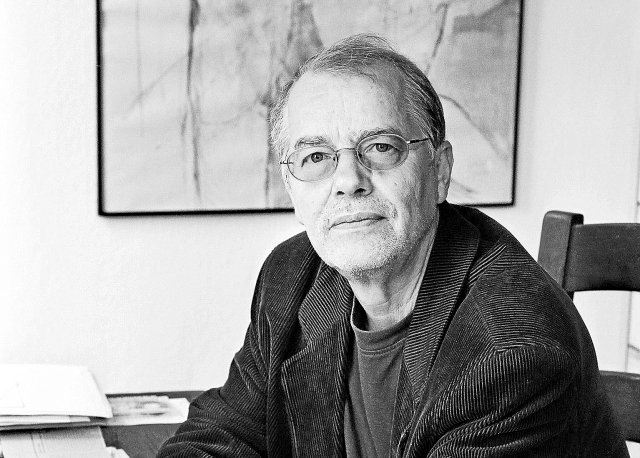“Poetry is the antidote of ceremonies, of formal constraints.” – Volker Braun, here 2003
Photo: Isolde Ohlbaum
It was shortly before Volker Braun’s most recent milestone birthday when the editorial team of a cultural magazine for which I had not previously worked approached me with the request that I would meet the man celebrating his birthday for an interview. Editors always come up with good news or bad news: I am informed that I only have a handful of days before an authorized version is due; But Braun is already informed about everything and agrees to everything.
As if to prove it, I was provided with a Berlin landline number that I could use to find an appointment. Braun answers the phone – and doesn’t know anything. He’s sorry, but his latest book is about to go to print. It was impossible to make time for an interview, even if he would have liked to do it.
A little clumsily, I make another attempt: I would come to any location of his choice, but a telephone interview was also possible; I could create a concentrated conversation atmosphere in which we could agree on my questions within 25 minutes. Braun laughs kindly. With that, he says, I completely misunderstand his nature. Things were over at first. And the imaginative editor, incidentally, had gone into hiding.
I had misunderstood Braun’s nature. Since that first phone call, five years ago, a collection of his speeches and writings have been published under the title “Relocation of the Secret Point,” another volume with his distinctive miniature prose, “Handstreiche,” a new volume of poetry, “Große Fuge,” and so on with “Luf-Passion” a dramatic poem.
And what had been printed (and what had remained unprinted) in the previous six decades! After proletarian beginnings and studying philosophy, Braun initially made a name for himself as a poet, switched to drama, sought a permanent position at the theater as a dramaturg, became a novelist and, with his “Workdays,” chronicler of his own work and thinking. Since then he has alternated between his various artistic professions. It is unnecessary to summarize the countless work titles here.
Braun once again proves himself to be a distant relative of his writer colleague Peter Hacks, who succeeded in writing beautiful – the literary critic of the third millennium would say: autofictional – verses: “I can’t write less, / I can think of too many things.” I can now guess I have Braun’s nature.
On Tuesday, Volker Braun turns 85, and a new volume, hot off the press, entitled “Continuing Attempt to Live with Violence” is available in bookstores. What kind of strange book is this with such a programmatic title? Braun’s words take up exactly 100 pages. With a sense of form, the book is divided into three equal sections: “Attempting to move on a landmass,” “Attempting to keep my feet on the ground,” and – giving the title – “Continuing trying to live with violence «. Each part is introduced with a motto, with several mottos, which are accompanied by a graphic. Braun is not concerned with the one true word, formulated in a captivatingly clever way, it must also be set in motion by a counter-thought, by an image.
Through his new book, Braun presents himself to the reader as a literary essayist. No, this allocation of genres is not entirely fortunate. It is an astonishing prose with little plot, poetically worked through. And what that is, poetry, is made clear by the author himself in this book: “Poetry is the antidote of ceremonies, of formal constraints.” In dialogues and quotations, impressions from readings and his own views, with a view to the recent and the almost distant past , with a focus on his own feelings and with a concentration on distant areas, in a dialogue with himself and future generations, Braun proves himself to be a thoughtful author who is only complicated in the best sense of the word.
How inelegant it would seem if one wanted to retell the ideas of these three texts in a concise manner. If you want to explore this special form of literature, the only thing that helps is modesty that follows your own interest in reading.
“Trying to move on a landmass,” for example, is a poetic positioning, a reflection on one’s own writing, which one does not want to believe exists detached from place and time. Braun abandons Eurocentric hubris in order to repeatedly show connecting lines between the philosophies and literatures of different parts of the world. And in the end you ask yourself: Is Marx perhaps the name of a wise man from Asia?
After the “Soviet century” has come to an end, but on closer inspection the end of the story looks more like a stopover, we see the “Chinese century” dawning with Braun. His swan song to the experiment of communism, adorned with one or two Brecht paraphrases, can also be read as an intellectual resurrection for him, who protects the poetic from the ceremonial. Meanwhile: »Of course K will come back wrong. A bloody possibility in early, crude experiments, it gradually becomes a mere necessity,” says Braun. As you read, you approach knowledge with doubt.
You should take your time for this author, 85 years old.
Volker Braun: Continuous attempt to live with violence. Suhrkamp-Verlag, 100 pages, hardcover, €20.
Subscribe to the “nd”
Being left is complicated.
We keep track!
With our digital promotional subscription you can read all issues of »nd« digitally (nd.App or nd.Epaper) for little money at home or on the go.
Subscribe now!
